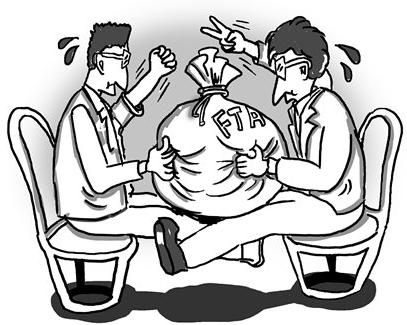Apathy, dissent threaten to derail Sino-Australian FTA

Global Times | 2014-1-20
Apathy, dissent threaten to derail Sino-Australian FTA
By Geoffrey Murray
Australian Prime Minister Tony Abbott wants to have free trade agreements (FTAs) signed with the "Big Three" in North Asia — China, Japan and South Korea — by the end of this year.
As far as China is concerned, negotiations have been dragging on for almost nine years now without much progress being made; maybe this time it will be different.
Currently visiting Australia, however, I find a very ambivalent, indeed a lukewarm attitude toward the whole thing. The best argument proponents can offer is that it would be better to have one than otherwise, which doesn’t suggest there’s much passion involved.
It’s a bit like the Chinese couple I knew some years ago who got married for no better reason than that they’d been dating sporadically for a number of years and it "would be a waste if we parted now." Perhaps unsurprisingly, the marriage was not a success.
One reason for a distinct lack of interest is that the absence of an agreement has not hampered the growth of bilateral trade - in recent years, growing at a very healthy rate of around 25 percent. In addition, many exports helping boost the Australian economy — minerals like iron ore, for example — are not covered by any form of restriction, such as tariffs.
Studies in fact, suggest that the gains from having an agreement would be almost nonexistent. For example, the Australia China Business Council commissioned a modeling assessment that effectively showed a "best case scenario" of a possible GDP gain of only 0.7 percent over a 20-year-period, which hardly suggests it is worth making the effort.
And this would only be the case if the FTA covered not just freedom of trade, but also freedom of investment — a very tricky area.
I have a strong feeling the Australians are now only showing more enthusiasm because their close neighbor, New Zealand, negotiated an FTA with China in 2008 that achieved some beneficial concessions on the Chinese admission of agricultural products. Agricultural exports, of course, are the subject of keen competition between Australia and New Zealand, and there’s no doubt Australian farmers are beginning to worry about being placed at a disadvantage.
Critics in Australia have been quick to point out that New Zealand had to pay a fairly high price by the phased elimination of tariffs on all products of Chinese origin, and making it easier for businesses to import Chinese labor — a very sensitive area for Australians.
In any conversation with knowledgeable Australians, I get a very distinct impression that the negatives may well outweigh the positives.
Yes, China might be willing to open up its market to more Australian farm produce, but at what cost elsewhere?
Certainly, the central government will want to see a much friendlier attitude on the issue of Chinese investment in Australia. It has been pressing the Australian side to raise the threshold for automatic scrutiny of Chinese investment in the country from A$248 million ($217.8 million) to A$1 billion.
This is a highly controversial issue. China has not forgotten how the State-run telecommunications giant Huawei was banned from involvement in Australia’s planned broadband network development program, which was undoubtedly a strategic decision taken out of concerns for national security.
That occurred under pro-China socialist administration in Canberra. Now, we have a much more conservative government in power led by a prime minister who has made no secret of his distaste for State-run enterprises getting involved in business.
There is also the issue of labor relations that cannot be ignored. At the time of writing, there is a private member’s bill before parliament that would forbid the government from striking a free trade deal with any country that is "not committed to protecting workers’ rights," which commentators see as killing any deal with China.
The bill specifically names all the international conventions a country would have to ratify in order to benefit from FTA treatment, such as freedom of association and the right to organize and bargain collectively. The highly militant Australian trade union and its political allies, the Australian Labor Party, are strong supporters of the idea.
Private member’s bills don’t normally stand much chance of being approved, and the present government has the numbers to ensure this one doesn’t. However, anything related to workers’ rights is a political minefield.
I’d say a free trade agreement might well be signed this year. But it will be ineffectual, and probably satisfy nobody.
The author is a lecturer with China Foreign Affairs University. bizopinion@globaltimes.com.cn





